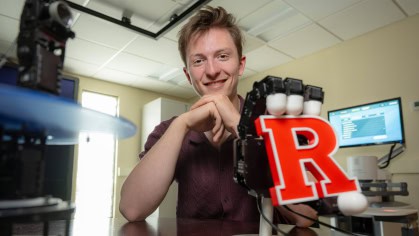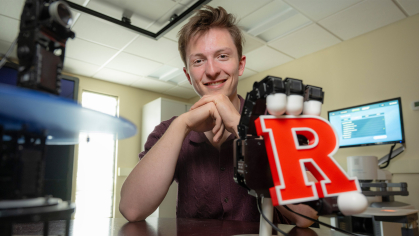Rutgers University Celebrates Youngest Graduate’s AI Innovations in Computer Science


From Classroom to Cutting-Edge: Alexander Geppert’s Journey at Rutgers
At just 18 years old, Alexander Geppert stands out not just as the youngest graduate of Rutgers University’s Class of 2025 but as a testament to the power of early passion and dedication in the fields of artificial intelligence and computer science. His journey, from a curious middle schooler exploring deep learning during lockdown to a groundbreaking researcher developing AI-powered robotic systems, is an inspiration to aspiring students and professionals alike.
Accelerated Academics and a Thirst for Knowledge
Geppert’s academic trajectory was anything but ordinary. He began his college education while still in high school, taking courses at Raritan Valley Community College and earning two associate degrees before even graduating. This allowed him to enter Rutgers University – New Brunswick as a junior, pursuing a double major in computer science and data science. His voracious appetite for knowledge, ignited by an early encounter with Ian Goodfellow’s seminal work on deep learning, propelled him through complex mathematical concepts and advanced coursework, setting the stage for his remarkable achievements at Rutgers.
Revolutionizing Robotics with AI: Geppert’s Research in Action
Under the mentorship of Professor Konstantinos Michmizos in the Computational Brain Lab, Geppert’s research focused on developing an AI-based computer vision system capable of recognizing human hand movements and translating them into real-time control of a biomimetic robotic hand. This innovative system utilizes a deep neural network, mirroring the intricate information processing of the human brain, to achieve remarkable precision and responsiveness. Michmizos lauded Geppert’s maturity, discipline, and exceptional research capabilities, highlighting his ability to navigate complex challenges with an insight that belied his age.
Bridging the Gap Between AI and Human Interaction
Geppert’s vision extends beyond technical prowess. He emphasizes the importance of designing AI systems that are not just powerful but also interpretable and integrated into real-world applications. He envisions AI as a tool to enhance human reasoning and decision-making, fostering deeper understanding and enabling individuals to tackle complex problems with greater confidence. His focus on the connection between humans and AI underscores his commitment to developing technology that empowers rather than replaces human intellect.
Looking Ahead: A Future in Generative AI and Multi-Agent Systems
This fall, Geppert embarks on a new chapter, pursuing a fully funded doctoral program at the University of Wisconsin-Madison. He plans to delve into the intricacies of multi-agent systems and generative AI, further refining his skills and contributing to the advancement of these cutting-edge fields. His ambition to build AI systems that help people navigate complex issues reflects a profound understanding of the transformative potential of artificial intelligence, not as an end in itself, but as a catalyst for human progress.
A Well-Rounded Experience: Balancing Academics, Athletics, and Personal Growth
Geppert’s time at Rutgers wasn’t solely defined by academic pursuits. He also found camaraderie and personal growth as a member of the Rutgers rowing team, demonstrating his ability to balance rigorous academics with demanding physical training and the development of strong interpersonal relationships. His holistic approach to education and personal development serves as a model for aspiring students seeking to excel in all aspects of their lives.
A Bright Future for AI Innovation
Alexander Geppert’s story is a compelling example of how passion, dedication, and a supportive academic environment can nurture exceptional talent. His groundbreaking research at Rutgers University – New Brunswick, combined with his vision for the future of AI, positions him as a rising star in the world of computer science and artificial intelligence. As he embarks on his doctoral studies, the world awaits the next chapter in his journey of innovation and discovery.
Interested in studying at Rutgers University? Fill out the form to schedule a free consultation with Studygram and explore how you can start your academic journey at one of the leading universities in the U.S.

